Does Bird Food Expire? Yes, bird food can expire, and feeding spoiled seeds to birds can be harmful. FOODS.EDU.VN is here to guide you on how to keep your birdseed fresh, ensuring the health and happiness of your backyard birds. Discover the lifespan of birdseed, signs of spoilage, and proper storage techniques. Learn how to provide the best nutrition for your feathered friends and prevent the spread of bird diseases.
1. How Long Does Bird Seed Last Before It Expires?
The freshness of birdseed depends on how it is stored. Birdseed can stay fresh for approximately 6 to 12 months when stored properly. Protecting the seed from extreme heat and moisture is crucial, as these conditions can promote the growth of mold and mildew. Optimal storage practices can extend the life of your birdseed, ensuring it remains a nutritious and safe food source for birds.
1.1 Factors Affecting Birdseed Lifespan
Several factors influence how long birdseed remains fresh. The type of seed, storage conditions, and quality of the seed all play a role. Understanding these factors helps in making informed decisions about purchasing and storing birdseed.
1.1.1 Type of Birdseed
Different types of birdseed have varying shelf lives. For instance, oily seeds like sunflower seeds and peanuts are more prone to rancidity due to their high-fat content. Seed mixes containing these types of seeds may spoil faster than mixes with lower fat content. FOODS.EDU.VN recommends checking the expiration dates and understanding the composition of your birdseed mix.
| Seed Type | Average Shelf Life (Properly Stored) | Notes |
|---|---|---|
| Sunflower Seeds | 6-9 months | High oil content; prone to rancidity |
| Safflower Seeds | 8-12 months | Relatively stable |
| Nyjer Seeds | 6-8 months | Also known as thistle seed; can dry out and lose appeal |
| Peanuts | 6-9 months | High oil content; prone to mold and rancidity |
| White Proso Millet | 12+ months | Good for ground-feeding birds; stores well |
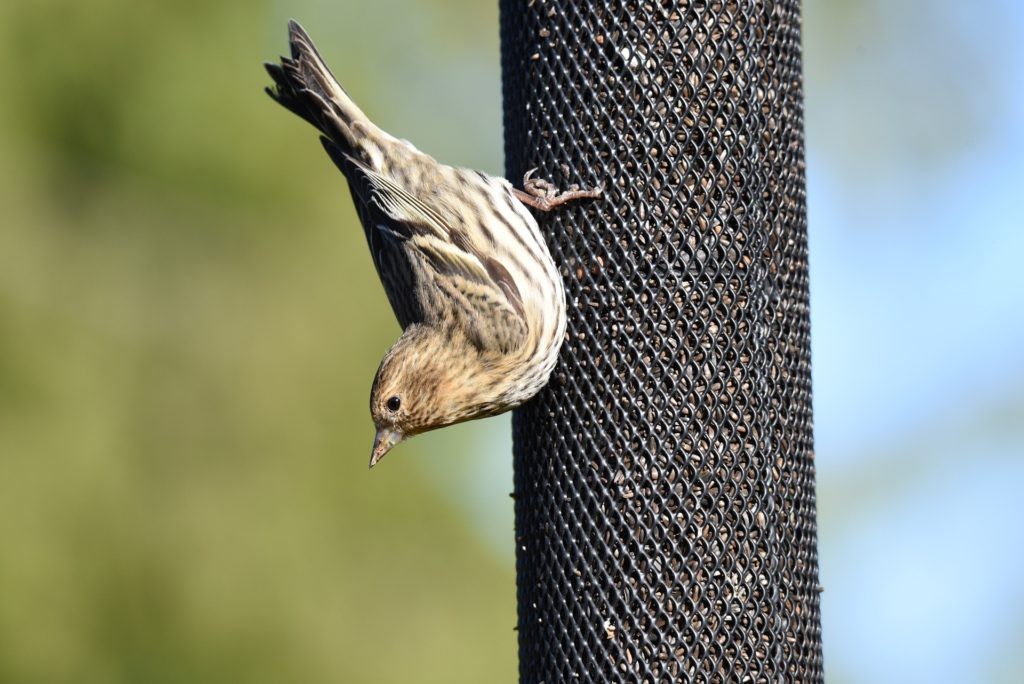
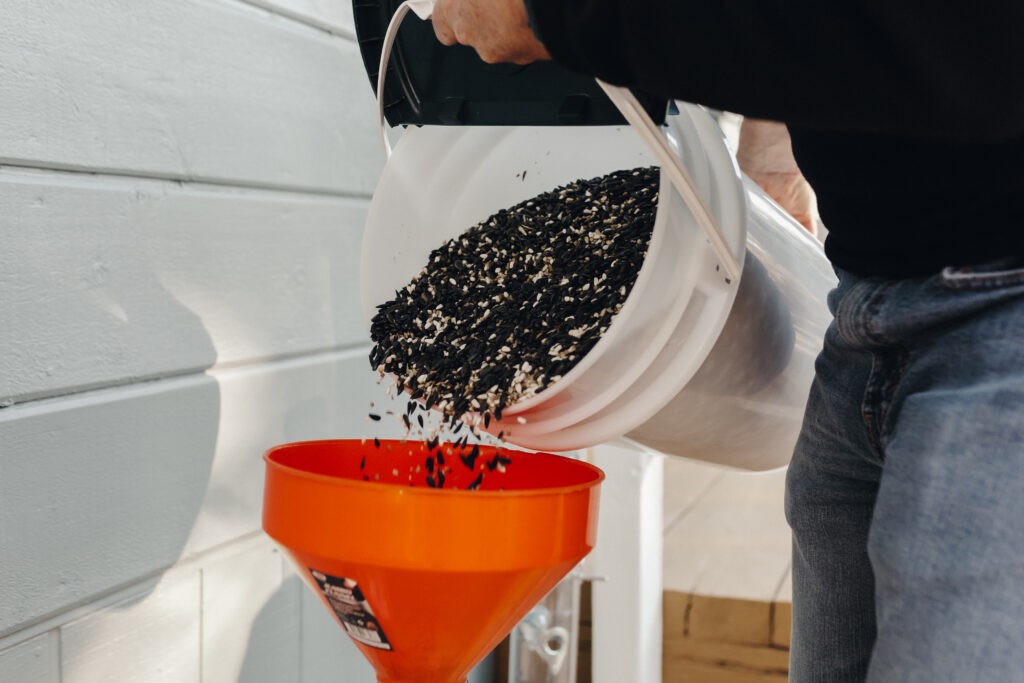
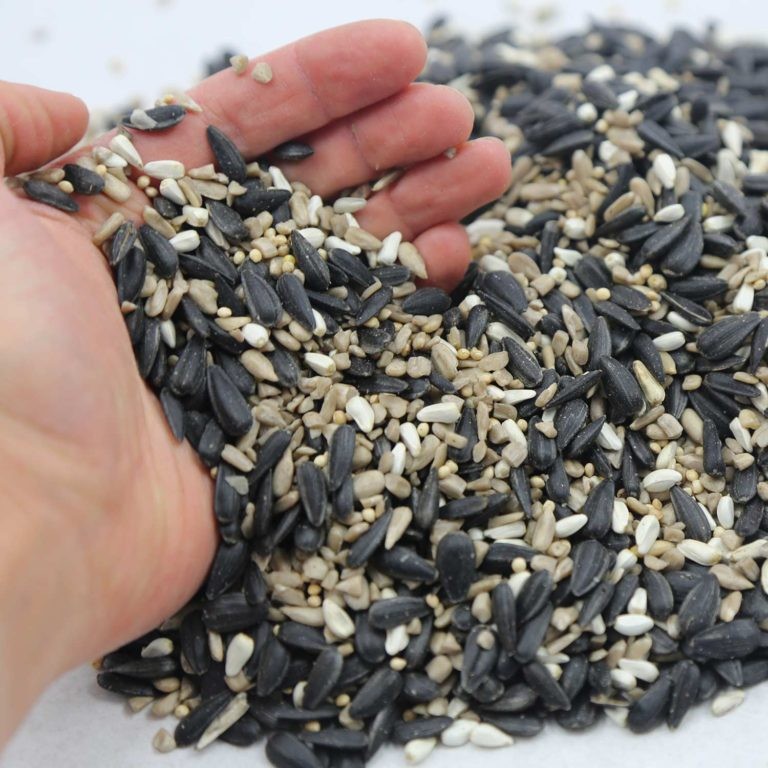
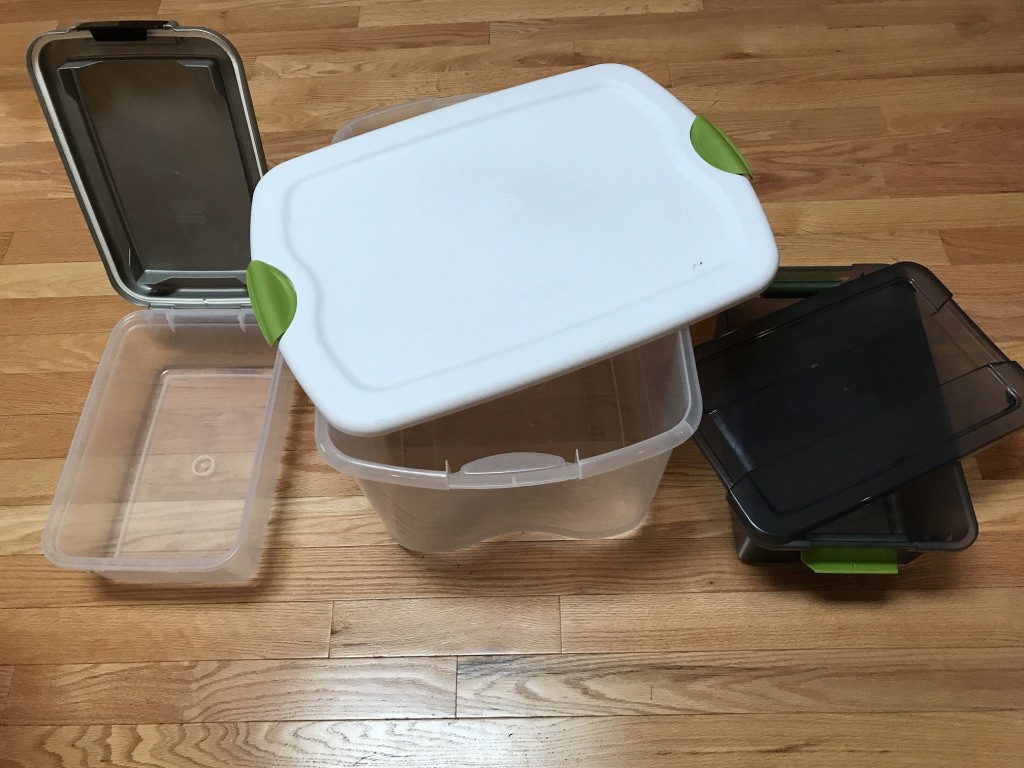
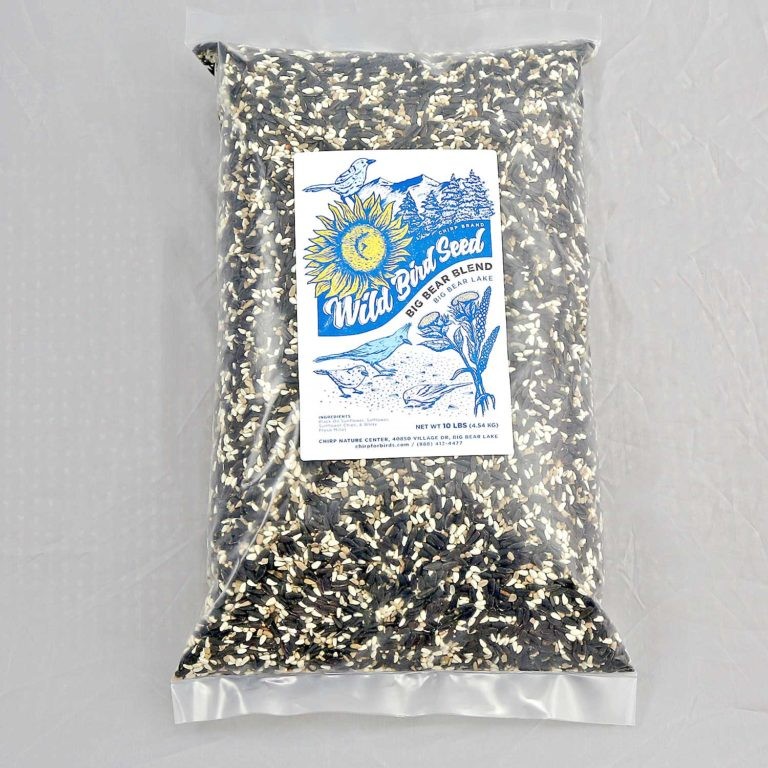
1.1.2 Storage Conditions
Proper storage conditions are crucial for extending the life of birdseed. Exposure to moisture, heat, and sunlight can accelerate spoilage. Storing birdseed in a cool, dry, and dark place helps maintain its freshness.
1.1.3 Seed Quality
The quality of the birdseed at the time of purchase also affects its lifespan. High-quality seeds from reputable sources are more likely to be fresh and free from contaminants. FOODS.EDU.VN advises purchasing birdseed from trusted suppliers to ensure you are getting the best product.
1.2 The Impact of Storage on Birdseed Freshness
Proper storage significantly impacts the freshness and longevity of birdseed. Understanding how different storage methods affect the seed can help you keep it fresh for longer.
1.2.1 Temperature
Temperature plays a vital role in birdseed storage. High temperatures can cause the oils in the seeds to go rancid, reducing their nutritional value and palatability. Storing birdseed in a cool environment helps slow down this process. The ideal temperature for storing birdseed is below 70°F (21°C).
1.2.2 Humidity
Humidity is another critical factor in birdseed storage. High humidity levels can lead to the growth of mold and mildew, which can make the seed unsafe for birds. Storing birdseed in a dry place and using airtight containers can help prevent moisture from getting in.
1.2.3 Sunlight
Exposure to direct sunlight can also degrade birdseed. The ultraviolet (UV) rays in sunlight can break down the nutrients in the seeds and cause them to spoil faster. Storing birdseed in a dark place or using opaque containers can protect it from sunlight.
2. What Are the Obvious Signs That Birdseed Has Expired?
Recognizing the signs of spoiled birdseed is essential for protecting the health of the birds that visit your feeders. Here are some clear indicators that your birdseed has gone bad:
2.1 Visual Signs of Expired Birdseed
Visual cues can often indicate that birdseed has spoiled. Keep an eye out for the following signs:
2.1.1 Mold Growth
One of the most obvious signs of spoiled birdseed is the presence of mold. Mold can appear as a white, green, or black powdery substance on the seeds. Moldy birdseed should be discarded immediately, as it can be harmful to birds.
2.1.2 Clumping
If the birdseed is clumping together, it may indicate that it has been exposed to moisture. Clumped seeds are often a sign of mold or bacterial growth. Discard any birdseed that is clumpy or feels damp.
2.1.3 Insect Infestation
The presence of insects or larvae in the birdseed is another sign of spoilage. Insects can contaminate the seed and make it unappetizing for birds. Check for live or dead insects, as well as insect droppings.
2.1.4 Sprouted Seeds
If the seeds are sprouting, it means they have been exposed to moisture and have begun to germinate. Sprouted seeds are less nutritious and can also be a sign of mold growth.
2.2 Olfactory Signs of Expired Birdseed
Smell can also be a reliable indicator of birdseed freshness. Here are some odors to watch out for:
2.2.1 Musty Odor
A musty or moldy odor is a strong indication that the birdseed has spoiled. This smell is caused by the growth of mold and bacteria. Discard any birdseed that has a musty smell.
2.2.2 Rancid Odor
Oily seeds like sunflower seeds and peanuts can develop a rancid odor when they go bad. This smell is caused by the oxidation of the fats in the seeds. Rancid birdseed is unpalatable for birds and should be discarded.
2.3 Behavioral Signs of Expired Birdseed
The behavior of the birds visiting your feeders can also indicate whether the birdseed is fresh.
2.3.1 Birds Avoiding the Feeder
If birds suddenly stop visiting your feeder, it may be a sign that the birdseed has spoiled. Birds are often sensitive to changes in the quality of their food and will avoid eating spoiled seed.
2.3.2 Seed Left Uneaten
If the birds are visiting the feeder but leaving the seed uneaten, it may also indicate that the seed has gone bad. Birds will typically consume fresh, high-quality seed quickly.
3. What Are the Dangers of Feeding Birds Expired Birdseed?
Feeding birds expired birdseed can have several negative consequences for their health and well-being. Spoiled birdseed can contain harmful toxins and pathogens that can cause illness or even death in birds.
3.1 Health Risks to Birds
Expired birdseed can expose birds to various health risks. Here are some of the potential dangers:
3.1.1 Mycotoxins
Moldy birdseed can contain mycotoxins, which are toxic substances produced by fungi. Mycotoxins can cause a range of health problems in birds, including liver damage, immune suppression, and even death. A study by the University of Georgia found that mycotoxins in birdseed can significantly impact avian health.
3.1.2 Bacterial Infections
Spoiled birdseed can also harbor harmful bacteria, such as Salmonella and E. coli. These bacteria can cause gastrointestinal infections in birds, leading to symptoms like diarrhea, vomiting, and dehydration.
3.1.3 Nutritional Deficiencies
Expired birdseed loses its nutritional value over time. Feeding birds spoiled seed can lead to nutritional deficiencies, which can weaken their immune system and make them more susceptible to disease.
3.2 Spread of Diseases
Feeding birds expired birdseed can also contribute to the spread of diseases among bird populations. Birds that eat spoiled seed can become carriers of harmful pathogens and transmit them to other birds.
3.2.1 Avian Salmonellosis
Avian salmonellosis is a common disease in birds that can be spread through contaminated birdseed. Symptoms include lethargy, ruffled feathers, and diarrhea. In severe cases, avian salmonellosis can be fatal.
3.2.2 Aspergillosis
Aspergillosis is a fungal infection that can affect the respiratory system of birds. It is caused by the Aspergillus fungus, which can grow on moldy birdseed. Symptoms include difficulty breathing, coughing, and wheezing.
4. How Should You Store Bird Seed Properly to Prevent Expiration?
Proper storage is essential for maintaining the freshness and nutritional value of birdseed. Here are some tips on how to store birdseed properly to prevent expiration:
4.1 Choosing the Right Container
Selecting the right container is the first step in proper birdseed storage. The ideal container should be airtight, waterproof, and rodent-proof.
4.1.1 Airtight Containers
Airtight containers help prevent moisture from getting into the birdseed, which can lead to mold growth. Use containers with tight-fitting lids or rubber seals to ensure they are airtight.
4.1.2 Waterproof Containers
Waterproof containers are essential for storing birdseed outdoors or in damp environments. These containers prevent water from seeping into the seed and causing spoilage.
4.1.3 Rodent-Proof Containers
Rodents can be attracted to birdseed and can chew through containers to get to it. Use containers made of durable materials like metal or thick plastic to prevent rodents from accessing the seed.
4.2 Selecting the Right Storage Location
The storage location is just as important as the container. Choose a location that is cool, dry, and dark.
4.2.1 Cool Environment
Store birdseed in a cool environment to prevent the oils in the seeds from going rancid. Avoid storing birdseed in direct sunlight or near heat sources.
4.2.2 Dry Environment
A dry environment is essential for preventing mold growth. Store birdseed in a place where it will not be exposed to moisture, such as a garage, shed, or basement.
4.2.3 Dark Environment
Exposure to sunlight can degrade birdseed, so store it in a dark place. If you must store birdseed in a location with some light, use opaque containers to protect it from the sun’s rays.
4.3 Best Practices for Birdseed Storage
In addition to choosing the right container and location, there are several other best practices to follow when storing birdseed.
4.3.1 Buy in Smaller Quantities
Purchasing birdseed in smaller quantities ensures that you use it up before it has a chance to spoil. This is especially important for seed mixes that contain oily seeds.
4.3.2 Check Regularly for Spoilage
Make it a habit to check your birdseed regularly for signs of spoilage. Look for mold, clumping, insects, and unpleasant odors. Discard any seed that shows signs of spoilage.
4.3.3 Clean Storage Containers
Before refilling your birdseed container, clean it thoroughly with hot water and soap. This will help remove any mold spores or bacteria that may be present.
4.3.4 Use Desiccants
Consider using desiccants, such as silica gel packets, to absorb moisture in the storage container. This can help keep the birdseed dry and prevent mold growth.
5. How to Extend the Shelf Life of Bird Seed
Extending the shelf life of birdseed requires a combination of proper storage techniques and smart buying habits. Here are some additional tips to help you keep your birdseed fresh for longer:
5.1 Consider Vacuum Sealing
Vacuum sealing can be an effective way to extend the shelf life of birdseed. Vacuum sealing removes air from the container, which helps prevent oxidation and mold growth. Use a vacuum sealer to seal birdseed in airtight bags or containers.
5.2 Freeze Bird Seed in Small Batches
Freezing birdseed can also help extend its shelf life. Divide the birdseed into small batches and freeze them in airtight containers. Thaw only the amount of seed you need at a time to prevent spoilage.
5.3 Add Oxygen Absorbers
Oxygen absorbers can help remove oxygen from the storage container, which can slow down the oxidation process and prevent rancidity. Add oxygen absorbers to your birdseed container to help keep it fresh.
6. Disposing of Expired Birdseed
Properly disposing of expired birdseed is essential for preventing the spread of diseases and protecting the environment. Here are some guidelines for disposing of spoiled birdseed:
6.1 Do Not Compost
Do not compost expired birdseed, as it may contain harmful pathogens that can contaminate your compost pile.
6.2 Seal in a Plastic Bag
Seal the expired birdseed in a plastic bag to prevent it from attracting pests or spreading contaminants.
6.3 Dispose of in the Trash
Dispose of the sealed bag of expired birdseed in the trash.
6.4 Clean the Feeder
After disposing of the expired birdseed, thoroughly clean your bird feeder with hot water and soap to remove any remaining contaminants.
7. Types of Bird Seed and Their Shelf Life
Understanding the different types of birdseed and their respective shelf lives can help you make informed decisions about purchasing and storing birdseed.
7.1 Sunflower Seeds
Sunflower seeds are a popular choice for bird feeding, but they are also high in oil and prone to rancidity. They typically have a shelf life of 6-9 months when stored properly.
7.2 Safflower Seeds
Safflower seeds are another popular choice for bird feeding and are less prone to rancidity than sunflower seeds. They typically have a shelf life of 8-12 months when stored properly.
7.3 Nyjer Seeds (Thistle Seeds)
Nyjer seeds, also known as thistle seeds, are small, black seeds that are popular with finches. They have a shelf life of 6-8 months and should be stored in airtight containers to prevent them from drying out.
7.4 White Proso Millet
White proso millet is a small, round seed that is popular with ground-feeding birds. It has a long shelf life of 12+ months when stored properly.
7.5 Peanuts
Peanuts are a high-energy food source for birds, but they are also prone to mold and rancidity. They have a shelf life of 6-9 months and should be stored in a cool, dry place.
8. Natural Ways to Keep Bird Seed Fresh
In addition to proper storage techniques, there are some natural ways to help keep birdseed fresh.
8.1 Use Bay Leaves
Bay leaves are a natural insect repellent and can help keep pests out of your birdseed. Place a few bay leaves in the storage container to help keep the seed fresh.
8.2 Add Garlic Cloves
Garlic cloves are another natural insect repellent and can also help prevent mold growth. Place a few garlic cloves in the storage container to help keep the seed fresh.
8.3 Use Diatomaceous Earth
Diatomaceous earth is a natural powder made from fossilized algae. It is a natural insecticide and can help keep pests out of your birdseed. Mix a small amount of diatomaceous earth into the birdseed to help keep it fresh.
9. Common Mistakes in Storing Bird Seed
Avoiding common mistakes in birdseed storage can help you keep your seed fresh and prevent spoilage.
9.1 Storing in Direct Sunlight
Storing birdseed in direct sunlight can cause it to spoil faster. The UV rays in sunlight can break down the nutrients in the seeds and cause them to go rancid.
9.2 Using Non-Airtight Containers
Using non-airtight containers allows moisture and pests to get into the birdseed, which can lead to mold growth and spoilage.
9.3 Storing in a Humid Environment
Storing birdseed in a humid environment can promote mold growth and cause the seed to spoil.
10. Understanding Bird Seed Expiration Dates
Understanding birdseed expiration dates can help you make informed decisions about purchasing and using birdseed.
10.1 How to Read Expiration Dates
Expiration dates are typically printed on the packaging of birdseed. The date indicates the last day that the seed is guaranteed to be fresh.
10.2 Importance of Adhering to Expiration Dates
Adhering to expiration dates is important for ensuring that the birds are getting fresh, nutritious food. Expired birdseed may have lost its nutritional value or may be contaminated with harmful pathogens.
11. How to Choose High-Quality Bird Seed
Choosing high-quality birdseed is essential for ensuring that the birds are getting the nutrients they need.
11.1 Look for Fresh Seed
Look for birdseed that is fresh and free from signs of spoilage. Check for mold, clumping, insects, and unpleasant odors.
11.2 Check the Ingredients
Check the ingredients list to make sure the birdseed contains a variety of nutritious seeds that are appropriate for the birds in your area.
11.3 Buy from Reputable Sources
Buy birdseed from reputable sources that are known for selling high-quality products.
12. Alternatives to Bird Seed
If you are concerned about birdseed spoiling, there are several alternatives you can offer to the birds in your yard.
12.1 Suet
Suet is a high-energy food source made from animal fat. It is a popular choice for winter feeding and is less prone to spoilage than birdseed.
12.2 Mealworms
Mealworms are a nutritious food source that is popular with insect-eating birds. They can be purchased live or dried and are less prone to spoilage than birdseed.
12.3 Fruits and Vegetables
Fruits and vegetables can also be offered to birds as an alternative to birdseed. Offer small pieces of fruit, such as berries, apples, and grapes, or vegetables, such as peas and corn.
13. Bird Seed Storage Tips for Different Climates
Different climates require different birdseed storage techniques.
13.1 Humid Climates
In humid climates, it is essential to store birdseed in airtight containers and use desiccants to absorb moisture.
13.2 Dry Climates
In dry climates, it is important to store birdseed in a cool, dark place to prevent it from drying out.
13.3 Cold Climates
In cold climates, birdseed can be stored in unheated garages or sheds, as long as it is protected from moisture and rodents.
14. DIY Bird Seed Storage Solutions
If you are looking for DIY birdseed storage solutions, here are a few ideas.
14.1 Repurpose Old Containers
Repurpose old containers, such as plastic buckets, metal cans, and glass jars, to store birdseed. Make sure the containers are clean and airtight.
14.2 Build a Bird Seed Storage Bin
Build a birdseed storage bin out of wood or metal. Make sure the bin is waterproof and rodent-proof.
14.3 Use a Food-Grade Bucket
Use a food-grade bucket with a tight-fitting lid to store birdseed. These buckets are designed to keep food fresh and are available at most hardware stores.
15. Frequently Asked Questions (FAQs) About Bird Seed Expiration
15.1 Can I Feed Expired Bird Seed to Other Animals?
It is not recommended to feed expired birdseed to other animals, as it may contain harmful pathogens that can make them sick.
15.2 How Often Should I Clean My Bird Feeder?
You should clean your bird feeder at least once every two weeks, or more often if you notice signs of spoilage or disease.
15.3 What is the Best Way to Attract Birds to My Feeder?
The best way to attract birds to your feeder is to offer a variety of high-quality seeds and keep the feeder clean and well-maintained.
15.4 Can Bird Seed Make Humans Sick?
Birdseed can make humans sick if it is contaminated with harmful pathogens, such as Salmonella or E. coli. Always wash your hands thoroughly after handling birdseed.
15.5 How Can I Tell if My Bird Feeder is Spreading Disease?
If you notice sick or dead birds around your feeder, it may be a sign that the feeder is spreading disease. Clean the feeder thoroughly and consider taking it down for a few weeks to allow the bird population to recover.
15.6 Is it Safe to Store Bird Seed in My Garage?
It is safe to store birdseed in your garage, as long as it is protected from moisture, rodents, and extreme temperatures.
15.7 What Types of Seeds Do Birds Prefer?
Different types of birds prefer different types of seeds. Some popular choices include sunflower seeds, safflower seeds, nyjer seeds, and white proso millet.
15.8 How Do I Keep Squirrels Away from My Bird Feeder?
There are several ways to keep squirrels away from your bird feeder, including using squirrel-proof feeders, offering safflower seeds (which squirrels don’t like), and placing the feeder in a location that is difficult for squirrels to access.
15.9 Can I Mix Old and New Bird Seed Together?
It is not recommended to mix old and new birdseed together, as the old seed may contaminate the new seed with mold or bacteria.
15.10 Where Can I Learn More About Bird Feeding?
You can learn more about bird feeding by visiting FOODS.EDU.VN, where you will find a wealth of information on birdseed, bird feeders, and bird conservation.
Conclusion: Prioritizing Bird Health with Fresh Food
Ensuring the freshness of birdseed is essential for the health and well-being of the birds that visit your feeders. By understanding the factors that affect birdseed lifespan, recognizing the signs of spoilage, and following proper storage techniques, you can provide a safe and nutritious food source for your feathered friends. Remember, fresh birdseed not only keeps birds healthy but also prevents the spread of diseases.
Are you passionate about providing the best for your backyard birds? At FOODS.EDU.VN, we offer in-depth articles, expert tips, and comprehensive guides to help you become a knowledgeable and responsible bird feeder. Explore our resources to learn more about birdseed selection, feeder maintenance, and bird conservation. For further assistance, visit us at 1946 Campus Dr, Hyde Park, NY 12538, United States, or contact us via WhatsApp at +1 845-452-9600. Visit our website at FOODS.EDU.VN to discover a wealth of information and join a community of bird enthusiasts dedicated to providing the best care for our avian friends. Let foods.edu.vn be your trusted resource for all things related to bird feeding and care.
